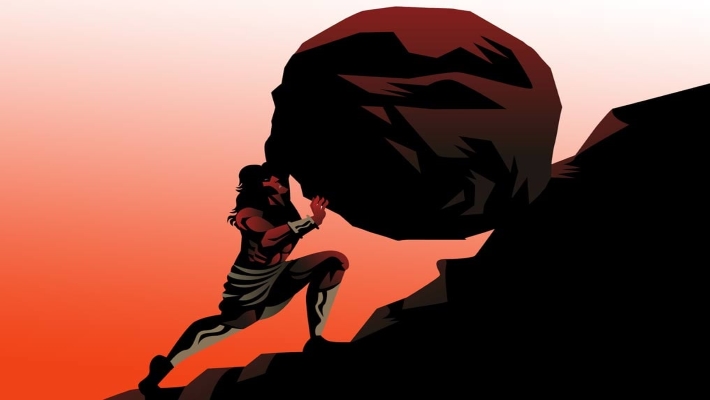
One of the laws of nature dictates that any being born to the Earth has to return to the Earth, it’s a symbolic way of saying equilibrium should be maintained. Like the yin and the yang, fire and water, heaven and earth and Life and death. In ancient mythology, any mortal who was found tampering with the natural order of the world had been dealt with. Sisyphus is one such individual, Homer described him as the craftiest of man. His wit allowed him to escape the clutches of death not once but twice.
His First Escapade
Sisyphus was the son of Aeolus and Enarete. The founder and first king of Ephyra (Modern day Corinth), Sisyphus was prominent for promoting navigation and commerce, which earned him an invite to one of the banquets of the gods on mount Olympus, the home of the Olympian Gods. He committed the sin of revealing one of the secrets of Zeus, the king of the Olympians and on top of it, he violated Xenia (Guest obligations), which came under the discretion of Zeus, his mistreatment and killing of guests to maintain his iron-fisted rule and his disrespect of the gods only angered Zeus, he ordered Thanatos to take him to the underworld, Thanatos went to Sisyphus to chain him and take him, but the crafty king knew that it was Charon who would ferry people to the underworld not Thanatos, he saw the loose chains Thanatos was having and he wondered if such loose chains can restrain him, Thanatos to prove him wrong tried chaining his own wrist to show it works, Sisyphus took the chance to chain him and stuff him in his wardrobe. This was the first instance where he escaped death. This set off a chain of events which caused jeopardy in the mortal world and chaos on mount Olympus and Hades’ underworld. People had stopped dying in the mortal world, Ares was frustrated that people in wars weren’t dying and they continued to fight despite the fatal wounds they had, Hades' wrath knew no bounds when he learnt that the underworld had no new residents and Thanatos was still missing, after intense search the gods found Thanatos and freed him, restoring balance to the world.
There are alternate stories which tell Sisyphus chained Hades and the gods had threatened him that they would make his life miserable if he didn’t set Hades free.
His Second Escapade
Sisyphus at the end of his life ordered his wife to not give him a funeral and to just dispose of undressed his body in the streets as a test of her love and little did everyone know he had ulterior motives when his soul wandered to the river Styx, he met Persephone, daughter of Demeter and wife of Hades, he used his silver tongue to convince her that his wife had been disrespectful to him by not giving him a funeral so he wanted to take revenge by going back to the mortal world and make his wife’s life miserable. This smooth-talking convinced Persephone to let him return to the mortal world. This was the second instance where he escaped death.
Sisyphus had turned into a troubling individual for the gods to handle, Hermes approached him saying the gods would bestow him with immortality if he were to complete a task, the task was to roll the boulder up a hill and if he were to finish this task, he would be rewarded as promised, the mortal king took up the challenge. He started to roll the boulder and just as he was about to reach the top, the boulder rolled back down, he attempted it again, but the result did not change, he did it countless times but there was no change, he had been condemned to roll the boulder up a hill for all eternity, little did he know the boulder was enchanted by the gods such that if it were to ever reach anywhere near the top it would roll down.
Persistence of Man
If you ever heard the term “Sisyphean”, this is the origin of that word, a fruitless struggle or a near-impossible task. There are various interpretations here, this tale can signify man’s perseverance when the odds are stacked against him, and this can also be interpreted as the fate of those who try to claim they are superior to the gods. Man should accept his failures just as he accepts his achievements. He teaches us to never give in to circumstantial disappointments or escape from our failures.







